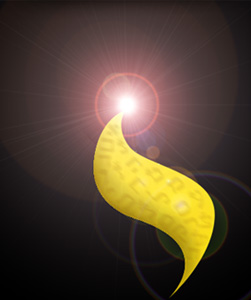So then where does the true seed of Judaism slumber? According to Rushkoff, it is most purely to be found in those who have walked away from the preexisting Jewish institutions after not finding the answers or comfort one needs to justify walking the walk. Some, like me, eschew any concept of organized religion as antithetical to what should be a deeply personal experience of the universe and existence. (I'm the type who avoids saying, 'God bless you" when people sneeze, opting instead for 'gesundheit" or the more continental "vos souhat.") Yet it's not a simple tale of running away. Rushkoff seems to wax autobiographical when he writes, "Some of us became quite successful and respected in our secular endeavors, only to realize with painstaking clarity that the many insights and values we have come to fight for find their very foundations in the Jewish tradition we abandoned. Strangely, the very same culture from which we rebel also informs some of our most cherished beliefs. We come full circle."
Rushkoff claims that such 'lapsed" Jews are those who are closest to what Judaism was intended as and stood for since before the Christian Era: seekers guided not by static dogma but by an innate sense of truth and justice. Judaism is not intended to be not a set of rules or even a fealty to a literal historical document but a multidimensional object, different to every perspective at any given moment but always with something new to share. "We no longer understand it as a record of our fixed history or our God-ordained future; instead, we see it as something happening in every moment," Rushkoff writes. "It is not a record of Jewish history as much as it is a description of the eternal human condition, from which we may enact our own futures."
 Even my aversion to the word 'God,'" Rushkoff says, is etymologically born out of the abbreviation of 'Yahweh" in Hebrew, which itself is a product of the distinctly Jewish
abstract monotheism and iconoclasm. God is not a person or even a thing; to
the best testament we've got, our own senses, God is everyone, including
ourselves, so the most logical way in which to worship is in life, not in
pews, and together. To quote Rabbi David Cooper, "God" is a verb.
Even my aversion to the word 'God,'" Rushkoff says, is etymologically born out of the abbreviation of 'Yahweh" in Hebrew, which itself is a product of the distinctly Jewish
abstract monotheism and iconoclasm. God is not a person or even a thing; to
the best testament we've got, our own senses, God is everyone, including
ourselves, so the most logical way in which to worship is in life, not in
pews, and together. To quote Rabbi David Cooper, "God" is a verb.
Rushkoff is speaking to, for, and about Jews like me. The Jewish State is not a place in the Middle East; it's a condition. You are a chosen person. You're the new Messiah. Save yourself by achieving that state. Sh'ma Y'Israel, Adonai Elohaynu, Adonai Echod. This is the anthem; get your damn hands up.
I've spent longer than my adult life resigning Judaism to little more than a quaint joke. For the first time since I can remember, while reading Nothing Sacred I felt a swell of pride to be able to claim membership in such a potentially-enlightened value set. For once, it was not hollow cheerleading; it is an effective demonstration why this ceaselessly-repeated story is of relevance to all to which I lend my identity. To be a Jew, at least for a moment, felt bigger than my grammar school classmates' snickers or a Midwestern milf's ignorance or a yeshiva kid's checklist; it felt as big as everything.



Symposium on
Douglas Rushkoff's
Nothing Sacred:
The Sacred and the Profane
A Conversation with Douglas Rushkoff
Reinventing the Wheel: A Review of Nothing Sacred
Michael Shurkin
They Gonna Crucify Me: A 'Lapsed Jew' Responds to Nothing Sacred
Ken Applebaum
Plus these other attractions:
Meditation and Sensuality
Jay Michaelson
Anything You Want to Be
Ben Cohen
Not Mentioned
Hal Sirowitz
Josh Graduates High School
Josh Ring
Zeek in Print
Spring 03 issue available here
Saddies
David Stromberg
about zeek
archive
links
